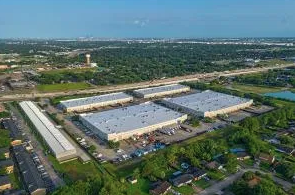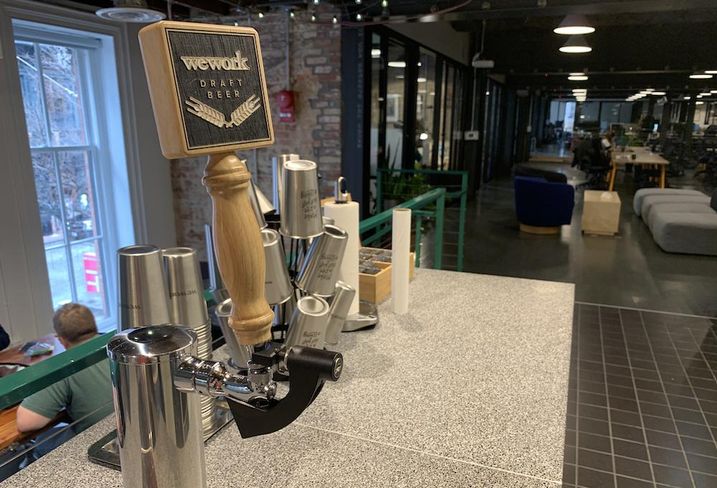TA Realty acquired the East Belt Business Park, a 350,000 SF, four-building industrial plan near the Port of Houston in Houston’s Southeast submarket. The seller, Morgan Stanley Real Estate Investing was represented by the JLL Industrial Capital Markets. East Belt Business Park comprises two rear-load and two cross-dock buildings that feature 20- to 24-foot clear heights, 114 dock-high doors, 14 drive-up ramps, 510 parking spaces and truck courts ranging from 120- to 180-foot . The property has been more than 90 percent leased since delivery. East Belt Business Park is three miles from the Port of Houston, a 25-mile long waterway that services 8,200 vessels and 215,000 barges each year.

Cushman & Wakefield (NYSE: CWK) announced today that the firm has acquired Colvill Office Properties, a leading provider of office agency leasing services in Houston. Colvill Office Properties currently directs leasing and marketing efforts for 17 million square feet of Class-A office space in Houston.
“As one of the five largest metro areas in the U.S., Houston remains a critically important market for Cushman & Wakefield,” said Andrew McDonald, President of Cushman & Wakefield’s West Region. “Providing our clients with the most respected and accomplished office agency in Houston complements our investor services platform significantly in Texas. The Colvill team has a proven track record of creating exceptional value for their clients and shares our commitment to collaboration and innovation.”
The Colvill Office Properties team has more than 130 collective years of experience and is a four-time recipient of the Owner’s Representative of the Year award as voted by the Houston Office Leasing Broker’s Association (HOLBA). The Colvill current portfolio includes more than 30 individual properties in the CBD, Energy Corridor/Katy Freeway, Galleria/Uptown, Westchase, West Belt, Springwoods and Inner Loop submarkets.
“We could not be more thrilled to join one of the world’s pre-eminent commercial real estate firms,” said Chip Colvill, the founder and former president/CEO of Colvill Office Properties, who joins Cushman & Wakefield as Executive Vice Chairman. “The depth and breadth of Cushman & Wakefield’s global platform and the outstanding team already on the ground here in Houston will enable us to deliver even more value for our building owners, taking what we’ve built at Colvill over the last two decades to the next level with the Cushman & Wakefield international platform.”
About Cushman & Wakefield
Cushman & Wakefield (NYSE: CWK) is a leading global real estate services firm that delivers exceptional value for real estate occupiers and owners. Cushman & Wakefield is among the largest real estate services firms with approximately 51,000 employees in 400 offices and 70 countries. In 2018, the firm had revenue of $8.2 billion across core services of property, facilities and project management, leasing, capital markets, valuation, and other services.
A little while back, I wrote about how an emerging new category of workplace alternatives are attracting attention from both the venture community and some of the commercial real estate’s biggest players.
One such company is Austin-based Swivel, which has developed an agile leasing platform and network. The startup just raised $8 million in Series A funding led by Jim Breyer of Breyer Capital (who’s also backed the likes of Facebook and Spotify). Breyer is contributing $5 million of the capital. JLL Spark, the venture arm of commercial real estate brokerage giant JLL, put up the remaining $3 million. The financing brings Swivel’s total raised to $14.6 million, according to its Crunchbase profile.
Swivel raised an $850,000 seed round in 2016 and then another $1 million in June 2017. In 2018, the company brought in another $4.8 million in what Swivel founder and president Scott Harmon described as a Seed 2 round.
The startup has been testing its model across Texas, mostly in Austin and some in Dallas and Houston.
“Everything seems to be proven right and working,” Harmon told Crunchbase News. “So we raised this round to scale up nationwide.”
How it works
Harmon founded Swivel in late 2016 with some initial incubation capital from Floodgate. He and Floodgate Co-Founder Mike Maples had started and sold a software company together in the late 1990s called Motive and decided they wanted to work together again.
They both had a passion for “simplifying the office,” Harmon said and felt like the commercial real estate office market needed to be disrupted.
So how does it work? Pre-qualified member companies can contract with Swivel’s landlord partners for turnkey office space on flexible terms with little or no upfront capital expenditure and no lease lock-in.
Landlords use the company’s agile leasing platform to backstop their leases for member companies. (I wrote about a similar startup, Landing, recently that is focused on flexible apartment leases). Using Swivel, leases are typically a 12-month commitment with a maximum of four years.
Clients are able to use Swivel’s software to configure and design the space however they want; most offices are between 3,000 and 10,000 square feet. Companies need only to give 60 to 90 days notice before moving out and they are not charged any penalties or move-out fees and don’t have to deal with subleasing.
Since its network launch in 2019, Swivel has signed up over 30 landlords representing more than 150 properties across Austin, Dallas, and Houston.
What it is and what it’s not
Harmon is quick to point out that unlike other flexible workspace operators such as WeWork or Knotel, Swivel is not a landlord. It does not lease space.
“We’re more like a VRBO for office space,” he told me. “People who own properties use our technology and platform to lease to new tenants on more flexible terms. Landlords make the money and share their profits with us.”
For example, a landlord can open up two floors in a building specifically to be listed via Swivel. They can charge a (10 to 20 percent higher) price per square foot because of the flexible terms, but it will still come out to about half the cost of a co-working space, Harmon said. The swivel will completely furnish the space, and “the building becomes more valuable,” according to Harmon.
“We work with hundreds of landlords,” Harmon said, “and we allow them to make more money by bringing a different kind of client into their building and providing a new class of service.”
Swivel is also not out to replace commercial real estate brokers, opting instead to partner with them so it saves money on marketing as well. It works out well for all involved, Harmon said.
Looking ahead
Swivel’s target market is tech-enabled companies in their growth phase, which make up about half of the tenants leasing through its platform. (It works with tenants such as Dremio, Graylog, Guideline 401k, hOp, Plivo, Samcart, TalentRobot, and Verify.)
The process is a more appealing one to tech upstarts that simply prefer a more digital process in general.
“They’re just used to the flexibility and that sort of convenience in other parts of their lives,” Harmon said.
But Swivel has also helped a number of multinational companies that require flexibility for their satellite offices.
The company plans to use its new capital primarily to expand across the U.S. in 2020. It is in talks with landlords in Boston, New York, Northern Virginia, Charlotte, N.C., Los Angeles, Salt Lake City, Utah, Denver, and San Francisco.
“Expansion cities are a finite list and expand based on how our landlord partnerships unfold,” Harmon said. “Landlord partners will determine the order and timing of opening up each market.”
For his part, Breyer believes Swivel’s business model is an ideal approach to help landlords be able to meet the evolving needs of tenants.
“As a VC, one of my mantras [to portfolio companies] is ‘don’t sign anything longer than two years,’ ” Breyer told me. “Real estate hasn’t kept up with that, as the leasing business hasn’t yet been tech-enabled, particularly in very important markets, like Silicon Valley and Austin.”
In general, he also believes flexible leases will become more and more important in general given workforce needs.
“The next generation thinks about flexibility first and foremost,” Breyer told me. “Swivel gives landlords the opportunity to attract the tenants of the future.”

An interpretation of mixed-use development, The Center for Pursuit’s next-generation facility broke ground this week in Houston’s East End, where it will relocate in 2021 to serve, support and empower the city’s adults with intellectual and developmental disabilities (IDD).
From its new campus, which starts construction next month, the nonprofit organization will also reach out into its neighboring communities with programs, public spaces and some retail, including a café.
Sitting on 3.8 acres of previously paved property, the new facility will encompass four buildings totaling 129,000 square feet, a 7,000-square-foot park and a 257-car parking structure.
The new buildings include a residential tower of 41 units; a programs building for adult training, employment services, and adult activities; a health and wellness building with fitness, medical clinic, cafeteria and café; and an administration building housing a welcome center, conference space, incubator workspace for other non-profit startups and one of the vocational programs.
A United Way agency, the 60-year-old organization now serves 450 clients, has 40 residents and provides daycare to 300 severely disabled adults, many of which arrive by Metro van daily, according to organization sources at the groundbreaking event.
The pedestrian-friendly project’s new location on an infill parcel near downtown is served by Houston’s Metro Rail, something key to site selection, project leaders said at the event, attended by representatives of city, county and state government, related agencies, East End community leaders and current clients.
Including property acquisition and improvements, the project’s total cost has an estimated value of $71 million, said Charles C. Canton, the center’s president, and CEO. Construction is slated to begin in early February, with completion substantially completed in early 2021, he noted in a follow-up statement.
Funds raised to date have included the sale of the organization’s long-term facility on six acres overlooking Buffalo Bayou as well as a phased capital campaign. The most recent push, tagged “Strive,” closes the remaining $16.5 million sought, Canton said.
Part of the new project’s vision process (and fundraising) was a 4,000-mile bike ride to assess best practices at 30 facilities coast-to-coast, led by David C. Baldwin of SCFPartners, a board member and Pursuit Foundation trustee, and a series of charrettes. Integrating and providing choice to the spectrum of constituencies served by the facility was paramount to the planning, he said.
Historic Community, Industrial Neighborhood
Houston’s East End is a multi-ethnic community where many of the city’s early industrial properties are under redevelopment, re-purposing, and replacement by both commercial and residential uses, especially townhomes.
Meanwhile, Buffalo Bayou Partnership last fall revealed its park and recreation master plan for the five-mile stretch of the bayou winding through the East End.
With gentrification concerns, a neighborhood issue, having community input as part of the new center’s planning process so that there was a relationship of trust established, said Marilu Garza, chief development officer for the organization.
Gensler’s Houston office designed the campus, excluding the residential tower, designed by Tramonte Design Studio with contractor Arch-Con.
The larger project team also includes landscape architects TBG Partners and construction by Harvey-Cleary.
“The beauty of the design is that it supports The Center’s mission of everyone having value and purpose,” noted Kristopher Stuart, Gensler principal, and design director, in a follow-up inquiry. “The Center for Pursuit and its board are to be applauded for the bold initiative they are taking to imagine a facility that not only serves their clients differently but also helps the rest of the society imagine a different role for these unique individuals.”
Open and Activated for Opportunity and Outreach
The project required creating a collection of buildings that serve their unique purpose while embracing the unique East End community, Stuart said. The buildings incorporate warehouse-style brick and exposed, painted steel beams to “reflect the historically industrial yet emerging character” of Houston east of downtown. In addition, the “aspiration” was for the facility to be embedded in the life of the surrounding community as well as a participant in it.
Garza noted the new site and build-out has higher visibility for the organization. “We want to be seen,” she said. “It’s important that the community embrace us.”
Canton said, “We’re excited by the quality of the new buildings.” To have renovated the existing ’70s vintage existing facility was cost-prohibitive. Hanover Co. acquired the property last year as part of its plans for a mixed-use development.
Since then, The Center for Pursuit has moved its administrative functions, programming, and daycare for severely disabling clients to a temporary facility south of downtown. The organization’s residential building, however, remains in use until the completion of the new residential building on the new campus, so that residents need only be moved once, Garza said.
Margaret Wallace Brown, city planning director, said the center’s new campus is an example of transit-oriented development, a city initiative.
At the groundbreaking, Houston Mayor Sylvester Turner spoke of Houston’s notable diversity, adding “being diverse means little if you’re not inclusive,” which the new facility has as part of its mission. The beauty of the center’s build-out — for a population often overlooked, he said — “speaks to our city’s values.”

Bye Bye, Booze: WeWork Killing Kegs At North American Locations NationalCoworking January 27, 2020, Ethan Rothstein, East Coast Editor Bisnow/Ethan Rothstein A beer tap is kept locked in a Washington, D.C., WeWork location. WeWork’s free beer taps, one of the defining attributes of the halcyon days of the coworking company, are almost kicked. WeWork is phasing out free beer and wine at it North American locations, a spokesperson confirmed to Bisnow Monday. The company doesn’t have kegs at all of its 600-plus locations, but they were staples of WeWork’s earliest outposts, which were also its most successful, according to WeWork’s financial disclosures last year. By the end of February, the taps will all be phased out, the spokesperson said. Business Insider first reported the change Monday morning. “Data from an expanded member satisfaction survey we conducted last year indicated many of our members wanted a greater variety of beverage options, and we are pleased to roll out these expanded offerings, including a selection of cold brew, kombucha, seltzer, and cold teas, in response,” WeWork said in a statement. “As part of this beverage refresh, WeWork will also phase out on-tap alcoholic beverages in U.S. and Canada locations and aims to complete this process by the end of February.” The beer and wine taps are expected to be replaced with nonalcoholic options, rather than removed. The decision came as a result of new WeWork Chairman Marcelo Claure’s go-forward plan for the business, and was prompted by a member survey, not as a cost-cutting move, a WeWork source said. Booze will still be served at WeWork happy hours and other events, the source added. Alcohol was once a pillar of WeWork’s identity, from bottomless-drink member parties to CEO Adam Neumann’s infamous penchant for shots of tequila. But the company was sued in 2018 by a former executive who said she was sexually assaulted twice at WeWork events, which she claimed “center around partying and reflect the frat-boy culture that starts at the top.” That litigation is still ongoing and is in the discovery phase, according to New York State court records. A month after the sexual harassment suit was filed, WeWork shifted its alcohol policy, from offering unlimited drinks and blatantly promoting consumption to a four-drink maximum. While the company claims cutting kegs isn’t about costs, its other recent stratagems have focused squarely on its blood-red balance sheet. After losing $1.25B in Q3 2019, WeWork nearly stopped leasing new spaces altogether in Q4, laid off 20% of its staff and has sold several previous acquisitions, including its stake in women-focused co-working company The Wing and digital meeting startup Teem in the last month.
An affiliate of Sealy & Co. has acquired a recently built distribution warehouse totaling nearly 500,000 square feet in the far northwest Houston area near Waller.
The 479,806-square-foot building at 18140 Kickapoo Road was acquired by Sealy Industrial Partners for an undisclosed price.
“Houston’s rapidly growing industrial market and increasingly low vacancy rates are attractive to us,” Scott Sealy Jr., the company’s chief investment officer, said in an announcement.
- Unlimited Digital Access for as little as 95¢
- Read more articles like this by subscribing to the Houston Chronicle
The property, on the south of U.S. 290 about eight miles past the Grand Parkway, was developed by Broad-Ocean, a China-based manufacturer of electric motors. The building is across U.S. 290 from the expansive Daikin Texas Technology Park. Broad-Ocean is a supplier to heating and cooling equipment maker Daikin.
RELATED: E-commerce continues to feed the industrial beast
Broad-Ocean, which leases the property, offer the new owner stable occupancy for several years, according to Sealy & Co.
“This is a core asset with features we believe to be attractive to many of the surrounding manufacturers, suppliers, and distributors,” Sealy said. “We’re looking forward to executing our strategy of acquiring at a discount to replacement cost and stabilizing the asset.”
Scott Sealy Jr., Jason Gandy, and Tom Herter led the Sealy investment services team on the transaction, while Tom Lynch and Mark Redlingshafer of CBRE represented the seller.
Sealy & Co. a commercial real estate investment and operating company with corporate offices in Dallas and Shreveport, La.
For more information on Houston office space, Houston retail space or Houston warehouse space and Houston industrial space, please call 713 782-0260 or see my web site at: www.houstonrealtyadvisors.com Thank you for your interest.


